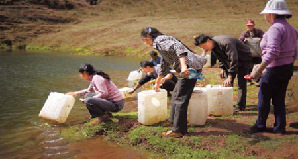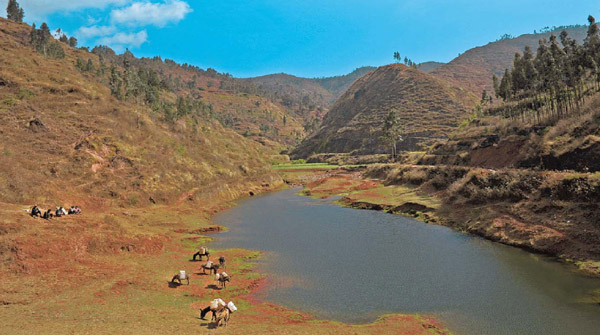Dilemma in drought zones: To move or not
Li Zuquan has thought about moving his family away from Dahuangdi for years. Deep in the mountains of Yunnan province, the remote village has no natural water sources, meaning drinking water supplies and irrigation are heavily dependent on rainfall.
 |
|
Villagers in Dahuangdi have to climb for two hours to get drinking water from a nearby mountain reservoir. [China Daily] |
"Unless we move, our lives will be decided by our natural environment," said the 45-year-old farmer, whose family has lived in Mouding county for generations.
More than 5,000 people in neighboring Nanhua county are expected to be relocated due to the ongoing drought in Southwest China, according to media reports. Officials insist the move is only a short-term fix.
"The relocation will be temporary. Villagers will just move into tents around the nearest water source and will move back when the drought eases," said Meng Fu, a publicity official for the administering city of Chuxiong. "The government has been resorting to 20-day relocations to help those affected by the drought since 2005."
However, although no one in Mouding has yet been offered a new home, many villagers say only a permanent move from the drought-prone zone will end their suffering.
When asked if he would like his family to be resettled, Li hesitated before answering: "This village has no water. If, like in Nanhua, we have to come back after 20 days, we'll still have to face the drought, only milder."
From Mouding, the seat of the county government, it takes four hours of driving on rocky mountain roads to reach Dahuangdi, a community of less than 100 people. The next village is about a day's walk away and residents must climb for two hours to get drinking water from a mountain reservoir, their only available source during dry spells.
"When we have enough rainfall, farmers can easily afford food and clothes, and can possibly even have 1,000 yuan ($145) left in their pockets," said village head Wang Qiongzhen. "If we don't have enough rainfall, farmers are likely to go hungry."
Li stocks his food in the attic of his crumbling adobe house. All his family has is 30 kilograms of rice packed in a dirty weaving bag and a dried leg of pork hanging from a ceiling beam. He said mixing the food with corn will make it last for almost a month.
 |
|
The only reservoir close to Dahuangdi, a remote village hidden in the mountains of Mouding county, Yunnan province, has almost dried up after months of severe drought. Villagers believe moving away could be the only solution. [China Daily] |
His annual bean crop usually nets him 4,000 yuan, the majority of which is reinvested into seedlings and farm chemicals for the summer tobacco planting. The ongoing dry spell, China's worst in a century, has ruined any chance of a good harvest.
As the high-lying village has no natural resources, any produce from its farms is used to feed the families living there. Residents have not even been able to find wild vegetables on the arid surrounding hills to ease the food shortage, said Li.
"Relocation is their only way out of drought environment," said Li Jianqin, deputy director of the county education department. "In some places, the environment is too harsh for people to make a living. People cannot change the situation. They can only leave."
No free land
Although farmer Li Zuquan admits he is tempted to move his family, he knows that relocation would bring very different problems. The big question, he said, is: "If we moved, would the government give us land?"
Farming is vital to the family. Li Zuquan earns a total of between 8,000 and 9,000 yuan from his beans and tobacco, which he grows on four mu (0.2 hectares) of hillside land, three mu of which is allocated by the village. As much as half of that income goes to tuition fees for his 13-year-old daughter and 8-year-old son.
"I don't have other skills," he said. "Farming at least gives us enough food. If we moved to another place, we would live in a better house with a city water supply, but how could I feed my family?"
Arable land in Nanhua is sorely limited, making it difficult to set aside areas for farmers relocated from remote regions, said Wang, head of Dahuangdi. She explained the county authorities use bulldozers to create space in towns for newcomers to build homes and plant crops, but the soil is usually far less fertile than in the mountains.
"Without land farmers can't survive," she said. "They are less competitive in the city. It is hard for even college graduates to find jobs, let alone farmers."
The cost of relocation is also a concern for many people. "Even if the government grants subsidies to farmers, they would still need to pay at least 20,000 to 30,000 yuan," said Wang.
Such an amount is way out of Li Zuquan's league.
The door to the family's small house is made of several pieces of wood. There is no lock, said Li, because they have nothing to steal. Inside is only a wooden bed, some wooden chairs and a strong odor of cow dung.
Li has already lost his thumbnails due to decades of heavy labor, while malnutrition has caused both his front teeth to fall out in recent years. Yet he remains the family's only breadwinner. Along with his wife and two young children, Li also cares for his 73-year-old father, Li Wenxue, who has been unable to walk for 12 years and lives beside the cowshed.
"We can't move as we simply can't afford it," he said before adding he may have to borrow money, even though he is still paying off a bank loan of 1,000 yuan to cover the shortfall caused by an earlier drought.
Even for those who have already been relocated, it has been far from the perfect solution, prompting some of them to return to their hometowns just years later, said Ma Yongbin, of the Mouding water resource department.
 0
0 






